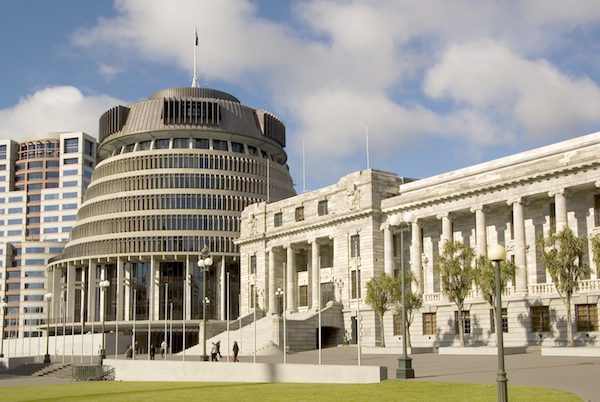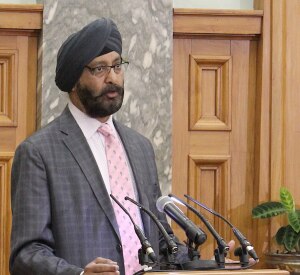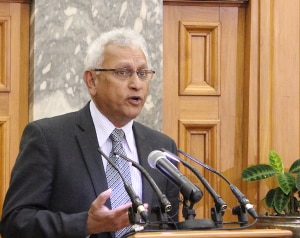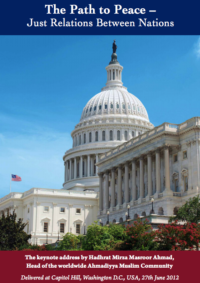World Peace – The Critical Need of the Time
Keynote Address by Head of Ahmadiyya Muslim Community at New Zealand’s National Parliament in Wellington on 4th November 2013
In the face of increasing tensions and conflicts in various parts of the world, Hazrat Mirza Masroor Ahmadaba, the worldwide Head of the Ahmadiyya Muslim Community delivered an historic address at New Zealand’s National Parliament in Wellington on 4th November 2013 advocating the urgent need for justice as a means to develop world peace, to an audience of parliamentarians, ambassadors of state, academics and a range of other guests.

“Bismillahir-Rahmanir-Raheem – In the Name of Allah, the Gracious, Ever Merciful.
All distinguished guests – Assalamo Alaikum Wa Rahmatullahe Wa Barakatohu – peace and blessings of Allah be upon you all.

First of all I would like to take this opportunity to thank all of those people who have organised this event, in particular the honourable Member of Parliament, Kanwaljit Singh Bakshi, and have given me the opportunity to address all of you today. Secondly, I would like to thank all of you who have come here to listen to me.
Of course, in this Parliament House, the various politicians and members of parliament regularly meet to develop policies and plans and to enact legislation all aimed at making the nation progress. Apart from this, I am sure many secular or worldly leaders will have come here and addressed you based on their knowledge, expertise and past experiences. However rarely, if ever, will you have been addressed by the head of a religious community and in particular a Muslim leader. Thus, for you to give me the opportunity to address you, as the worldwide Head of the Ahmadiyya Muslim Community, which is a purely Islamic organisation and whose sole objective is to spread the true teachings of Islam, is a sign of your open-heartedness and your very high levels of tolerance. Therefore, I am obliged to thank you for this kind gesture.
With these words of thanks, I would now like to move on to the main part of my address and say a few things about Islam’s beautiful teachings. I will speak about that issue, which in my opinion is the critical need of the time – and that is the establishment of world peace. From a secular perspective many of you, both politicians at an individual level and the government collectively, are making efforts towards achieving peace. Your efforts will be motivated by a good intent and you will have enjoyed some success in these efforts. Also, over the years, your government will have given advice to other major powers about the means to develop a peaceful and harmonious world.
No doubt, the state and circumstances of the world today are extremely precarious and are causing a great deal of concern to the entire world. Whilst some of the major conflicts today are taking place in the Arab world, the truth is that any wise or intelligent person will be aware that such conflicts will not remain limited to just that region. There is no doubt that a conflict between a government and its people can escalate into a much broader international conflict. Already, we find that two blocs amongst the major powers are forming. One bloc supports the Syrian Government, whilst the other is supporting the rebel forces. And so clearly this situation is not merely a grave threat to the Muslim countries but is also a source of extreme danger for the rest of the world.
We should never forget the heart-wrenching experiences of the two World Wars that occurred during the last century. The sheer devastation that they caused, in particular the Second World War, was unprecedented. Just through the use of conventional weapons heavily populated and thriving towns and cities were utterly demolished and left in absolute ruin and millions were killed.
Further, during the Second World War the world witnessed that truly devastating event when the atom bomb was used against Japan causing such annihilation that just hearing of its effects makes a person tremble and shudder. The museums in Hiroshima and Nagasaki are a sufficient reminder of the horrors and utter devastation that took place.

During the Second World War around 70 million people were killed and it is said that 40 million of those who died were civilians. Thus more civilians sacrificed their lives than military personnel. Further, the aftermath of the war was truly terrifying, whereby the post-war related deaths ran into millions. For many years after the nuclear bombs were used, radiation continued to have a terrible degenerative effect on new-born children. In today’s world, even some small nations have come to possess nuclear weapons and their leaders are trigger happy. It seems they do not care about the destructive consequences of their actions.
And so if we imagine a nuclear war occurring today, the picture painted leaves a person shaken and utterly petrified. The atom bombs possessed by smaller nations today are perhaps even more powerful than those that were used during the Second World War. And so this climate of conflict and instability can only cause great concern to those people who wish to establish peace in the world and who are working towards it.
The pathetic situation of today’s world is that at one level, people speak of establishing peace, whilst at another level they are engulfed in their egotistical ways and wrapped by a shroud of pride and arrogance. In order to prove their superiority and might, every powerful government is ready to make all possible efforts. After the Second World War, in an effort to establish long-lasting peace in the world and to prevent future wars, nations joined together to form an organisation, which they called the United Nations. However, it seems that just as the League of Nations miserably failed in its objectives, the status and respect of the United Nations continues to fall by the day. If the requirements of justice are not fulfilled, then no matter how many organisations are formed for the sake of peace, their efforts will prove fruitless.
I have just mentioned the failure of the League of Nations. The institution was formed after the First World War, with the sole objective of safeguarding world peace; however it could not stop the onset of the Second World War, which as I have already said caused so much devastation and loss. New Zealand also suffered casualties as a result of the war. It is said that it suffered a loss of around 11,000 people, virtually all of whom were from the military. As New Zealand was far removed from the epicentre of the war it did not suffer civilian casualties. However, as I have already alluded to, overall in the war more innocent civilians were killed than military personnel. Just imagine: normal innocent people, including countless women and children, were killed indiscriminately having committed no crime.
It is for this very reason that you will find in the hearts of people who live in countries which were directly engulfed in that war an innate hatred of war itself. Certainly, it is a requirement of loving one’s nation that if it is ever attacked, it is the duty of a citizen to be ready to give every sacrifice for its defence and to liberate the nation. Nevertheless, if the conflict can be resolved in a cordial or peaceful way through negotiations and diplomacy then one should not needlessly invite death and killings. In olden times when wars took place, there were mainly military casualties with a very minimum civilian loss. However, the means of today’s wars include aerial bombardment, poison gas and even chemical weapons. And as I said there is also the potential use of the most horrific weapon of all – the nuclear bomb. Consequently, the wars of today are entirely different to those of the past, because today’s wars could potentially wipe mankind from the face of the earth. Let me at this point present a beautiful teaching of the Holy Qur’an regarding the establishment of peace. The Qur’an says:
“And good and evil are not alike. Repel evil with that which is best. And lo, he, between whom and thyself was enmity, will become as though he were a warm friend.” (Chapter 41, Verse 35)
Thus, the Qur’an teaches that as far as possible, any enmities or grudges should be reconciled and solved by opening the channels of communication and through dialogue. Most certainly to speak to someone with kindness and wisdom can only have a very positive and endearing effect on their heart and is a means of removing hatred and grudges.
No doubt, we in this era believe ourselves to be extremely advanced and civilised. We have created various international charities and foundations that provide healthcare and education to children or that provide healthcare to mothers. Similarly, there are countless other charities established out of human sympathy and compassion. We, who have done all of this, should reflect and pay attention to the urgent need of the time and contemplate how we can save ourselves and others from devastation and destruction. We should remember that compared to six or seven decades ago the world is now much closer together. Sixty or seventy years ago New Zealand was a distant country, far away from Asia and Europe. However, today it is an integral part of one common global community. Thus, in a state of war, no country and no region is safe.
Your leaders and your politicians are the guardians of the nation. They are responsible for the safety of the country and for its continued progress and betterment. And so it is essential that they always keep in mind the critical point that it is from local wars that devastation and destruction spreads far and wide. We should be grateful to God that He recently granted sense and wisdom to some of the major powers so that they realised that they had to take action to stop war to prevent the utter devastation that would have ensued. Most pertinently, Russia’s President made efforts to hold back some of the other major powers from attacking Syria. He made it clear that all countries, whether large or small, should be treated equally. He also said that if the requirements of justice were not met and if other nations went to war independently then the United Nations would suffer the same sorry fate as the League of Nations. I believe that he was completely correct in this analysis. Although I do not support of all of his policies, but a word of wisdom ought to be accepted. I wish only that he had gone one step further and said that the right of veto power held by the five permanent members of the UN Security Council should be ended once and for all so that true justice and equity could prevail amongst all nations.
Last year, I was given the opportunity to make an address at Capitol Hill in Washington D.C. The audience included numerous Senators, Congressmen, think-tank representatives and many other educated people from various fields. I clearly said to them that the requirements of justice are only fulfilled when all parties and all people are treated equally. I said to them that if you want to highlight the differences between the large and small countries and the rich and poor nations and if you want to maintain the injustice of veto power, then restlessness and anxiety will certainly develop. Indeed such anxieties have already begun to show their face in the world.
And so, as the Head of a worldwide Muslim community, it is my duty that I should draw the attention of the world towards establishing peace. I consider this my obligation because Islam’s very meaning is peace and security. If certain Muslim countries carry out or promote hate-filled acts of extremism it should not lead to the conclusion that Islamic teachings promote disorder or strife. I have just quoted a verse of the Holy Qur’an and within it is a lesson of how to establish peace.
Furthermore, the Founder of Islam, the Holy Prophet Muhammadsa taught his followers to always give “Salaam,” meaning to always spread the message of peace. We know from his blessed example that he would invoke peace to all non-Muslims, be they Jews, Christians or the people of any other faiths or beliefs. He did so because he understood that all people formed part of God’s Creation, and because one of God’s names is the “Source of Peace’” and so He desires peace and security for all of mankind.
I have mentioned some of Islam’s teachings in relation to peace, but I should clarify that due to the lack of time I have mentioned only a few aspects. In truth, Islam is filled with commandments and teachings advocating peace and security for all people. And in relation to establishing justice what does the Qur’an say? In Chapter 5, Verse 9, Allah says:
“O ye who believe! Be steadfast in the cause of Allah, bearing witness in equity; and let not a people’s enmity incite you to act otherwise than with justice. Be always just, that is nearer to righteousness. And fear Allah. Surely, Allah is Aware of what you do.”
And so in this verse the Qur’an outlines the very highest possible standards of justice. This commandment leaves no room for people who call themselves Muslims yet who commit atrocities and brutalities. Neither does it leave any room for criticism from those people who consider or seek to portray Islam as a violent and extremist religion. The Qur’an has further laid down the most exemplary standards of justice and fairness. It has not only said to be just, but in fact advocates equity to such an extent that it states:
“O ye who believe! Be strict in observing justice, and be witnesses for Allah, even though it be against yourselves or against your kindred. Whether he, against whom witness is borne, be rich or poor, Allah is more regardful of them both than you are. Therefore do not follow your low desires that you may be able to act equitably. And if you hide the truth or evade it, then know that Allah is Well-Aware of what you do.” (Chapter 4, Verse 136)
And so it is such principled standards of justice that establish peace in the world, from the most basic element of society all the way through to the international arena. History testifies to the fact that the Founder of Islam, the Holy Prophet Muhammadsa, acted upon this teaching and spread it to all corners. And now in this era, the true devotee of the Holy Prophetsa, who was the Founder of the Ahmadiyya Muslim Jama’at (Community), Hazrat Mirza Ghulam Ahmadas of Qadian, spread and championed this teaching and instructed his followers to also spread peace. He further instructed his followers to draw the attention of mankind towards fulfilling both the rights of God and the rights of God’s creation. It is for this reason that the Ahmadiyya Community emphasises to all people the critical need of fulfilling the rights of Allah and of His creation and of establishing the very best standards of justice. It is my prayer that every single one of us, irrespective of religion or belief, pays heed towards fulfilling each other’s due rights, so that the world can become a haven of peace and harmony.
With these few words I conclude and I thank you once again for inviting me and coming here to listen to me.”
(Upon the conclusion of the event, Hazrat Mirza Masroor Ahmadaba met with various dignitaries including the Ambassadors of Iran and Israel. His Holiness was then given a tour of Parliament by Kanwaljit Singh Bakshi MP and thereafter His Holiness led the Zuhr and Asr prayers at the Parliament.)
New Zealand Parliament Reception November 4th 2013 – Guest Speeches

Hon Kanwaljit Singh Bakshi MP- Ruling National Party
“Thank you very much Your Holiness. It’s our privilege to have him here today in Parliament. Can I thank you all for coming here today and listening to his wisdom and it’s great to have his thoughts. I have been working with the Ahmadiyya Community for almost the last 10 years and I have always found that the main aim of this organisation has been to bring peace and work with the inter faith council and different religions…I’ll take this opportunity to particularly thank my parliamentary colleagues Dr Rajend Prasad, and Dr Kam Colder, who have specially flown in from Auckland to hear this lecture and obviously the ambassador of Israel, Cuba and Iran, also present here today and other members of the Diplomatic Core. Thank you very much!”
Hon Kanwaljit Singh Bakshi MP- Ruling National Party

Hon Dr Rajend Prasad MP – Member of Labour Party
“Your Holiness, a special welcome to you to parliament on behalf of the opposition and our leader David Cunliff, who for all kinds of reasons is unable to be here. It’s a pleasure for us to welcome you and acknowledge also our Ahmadiyya friends, and I have friends in the community and others who have come from the Diplomatic Core and friends from Wellington. My observation: I was born in Fiji, and I’ve been here almost 15 years now. Fiji also has a strong Ahmadi community and we have lots of friends in that community. I have always been impressed with the way they lead their lives. As true friends of the nation and of different faiths, but also reflecting your message, Your Holiness, of peace because there is nothing stronger than that message of peace. It’s amazing how difficult it is to get that message through in today’s world, because as Your Holiness reflected, its honoured more in its breach, than in respect for peace, so every message you give is important. This parliament is a very special place. This parliament has a strong tradition of standing for what is right and my colleagues and I respect, and our parties and our colleagues internalise that notion of peace and it’s good to hear it again and it’s good to remind us that not are we only talking about world peace, but peace in our communities, peace amongst our women, peace amongst our children and peace amongst those who are less fortunate than ourselves.
So it’s a wonderful reflection of that peace. I want to acknowledge Ahmadiyya leaders in Auckland for the very special work you do and for how you have gone about building your first Mosque and I wasn’t able to be there for its opening the other day, for our party conference was on in Wellington but know that we will be there to support you and that our colleagues from both sides of the house will be there too. Your Holiness, you are most welcome in New Zealand, you are most welcome in this parliament, along with our friends who are here as well and thank you for coming and honouring His Holiness and showing our respect for the Ahmadiyya Community and thank you for being here.”
Hon Dr Rajend Prasad MP – Member of Labour Party
